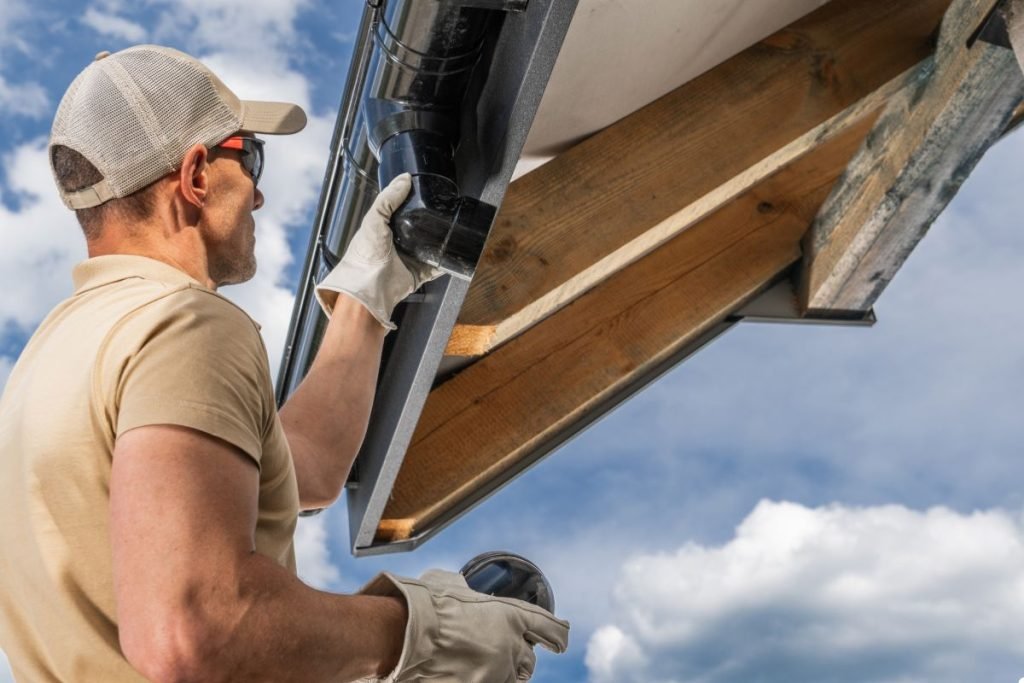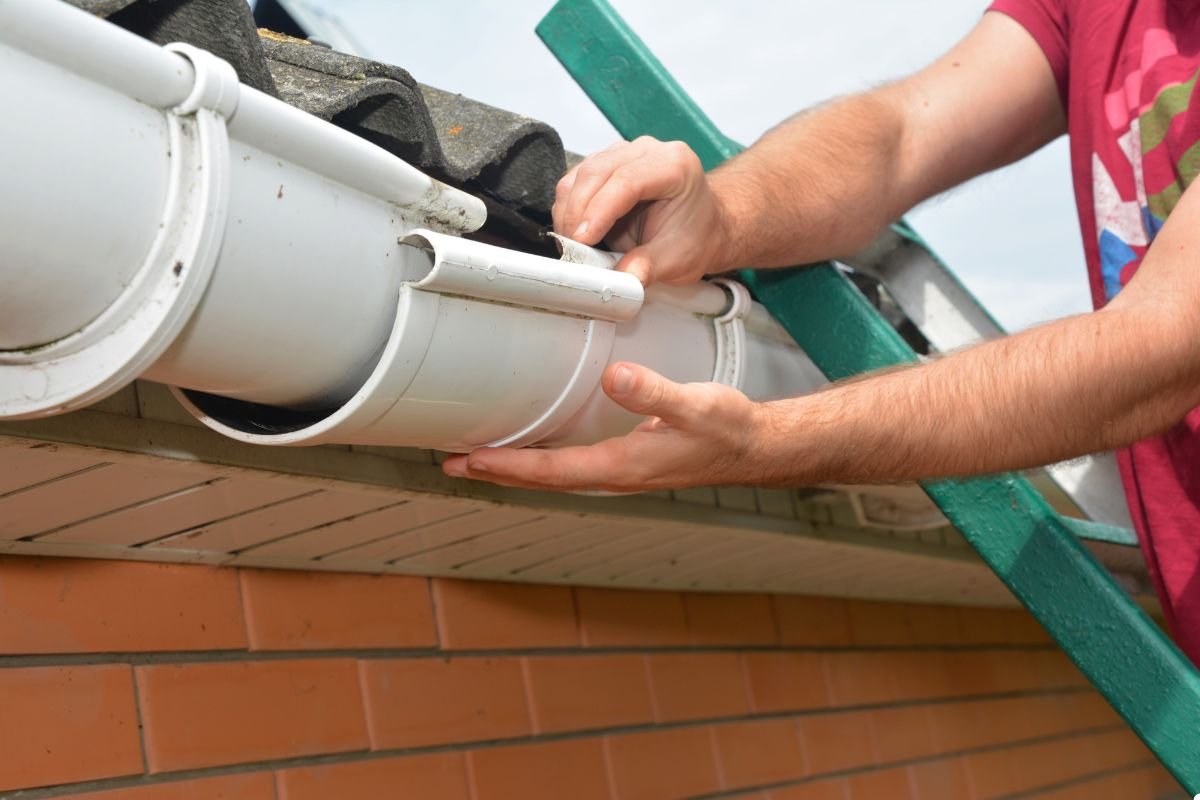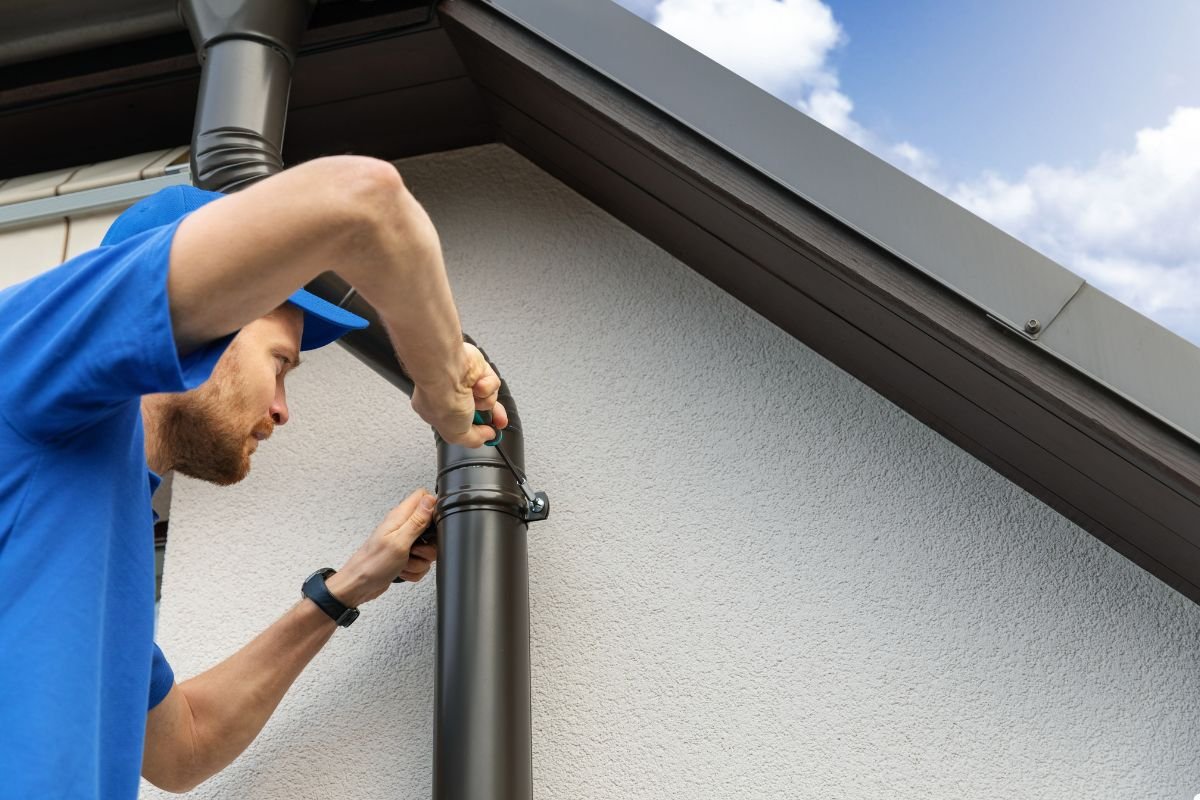
Are insulated gutters worth it? For many US homeowners, especially those in colder climates prone to ice dams, the answer is yes. While they represent a larger upfront investment compared to traditional gutters, the long-term benefits – reduced energy bills, prevention of costly water damage from ice dams, and extended roof life – can make them a worthwhile investment. This comprehensive guide will delve into the ins and outs of insulated gutters, helping you determine if they’re the right choice for your home. Call us today to learn more and get a free consultation!
Introduction: What are Insulated Gutters?
Insulated gutters are gutter systems designed with an added layer of insulation to prevent heat loss from your home and reduce the formation of ice dams. Traditional gutters are typically made of aluminum, steel, or vinyl, which conduct heat easily. This means that heat escaping from your roof can melt snow and ice on the gutters, which then refreezes at the colder edges of the roof, leading to ice dam formation. Insulated gutters, on the other hand, minimize this heat transfer, keeping the gutter system colder and less prone to ice buildup. Enhance your home’s efficiency with our services, offering expertly designed insulated gutter systems for year-round protection. This can save you money, protect your home from costly repairs, and provide peace of mind during harsh winter months.

How Insulated Gutters Work
The secret to insulated gutters lies in their construction. They typically feature a layer of insulation, often made of foam insulation, wrapped around the exterior of the gutter. This insulation acts as a barrier, preventing heat from escaping your home and melting snow and ice on the gutters. The materials used are designed to be weather-resistant and durable, ensuring long-lasting performance. Some insulated gutter systems even incorporate heating elements to further prevent ice formation in extreme conditions. By maintaining a consistent temperature, insulated gutters minimize the freeze-thaw cycle that leads to ice damming and gutter damage.
Benefits of Insulated Gutters
The benefits of insulated gutters extend beyond simply preventing ice dams. They offer a range of advantages for US homeowners:
- Preventing Ice Dams: This is the primary benefit. By reducing heat transfer, insulated gutters minimize the formation of ice dams, protecting your roof, walls, and foundation from costly water damage.
- Improving Energy Efficiency: By reducing heat loss through your roof, insulated gutters can help lower your energy bills, especially during the winter months.
- Extending Gutter and Roof Life: By preventing ice damming, insulated gutters can extend the lifespan of your gutter system and roofing materials. Ice dams can put significant stress on gutters, causing them to sag, break, or detach from your home.
Preventing Ice Dams
Ice dams form when melted snow refreezes at the edge of your roof, creating a dam that prevents further melting snow from draining properly. This trapped water can then seep under your shingles and into your home, causing significant damage to your ceilings, walls, and insulation. Insulated gutters significantly reduce the likelihood of ice dam formation, protecting your home from these potential problems. Consider the long term benefits of ice dam prevention, and how it will affect the longevity of your roof’s lifespan.
Improving Energy Efficiency
Heat loss through your roof is a common problem, especially in older homes with inadequate insulation. Insulated gutters can help reduce this heat loss, making your home more energy-efficient and lowering your heating bills. By keeping the gutters cold, they prevent heat from escaping through the roof and melting snow and ice on the gutters. This can result in significant savings over the long term.
Extending Gutter and Roof Life
Ice dams can put a tremendous amount of stress on your gutters and roof. The weight of the ice can cause gutters to sag, break, or detach from your home. The trapped water can also seep under your shingles, causing them to rot and decay. By preventing ice dams, insulated gutters can help extend the lifespan of your gutter system and roofing materials, saving you money on costly repairs in the long run.
Drawbacks of Insulated Gutters
While insulated gutters offer numerous benefits, it’s important to consider the potential drawbacks as well:
- Higher Initial Cost: Insulated gutters typically cost more than traditional gutters.
- Installation Complexity: Insulated gutters often require professional installation to ensure proper performance.
Higher Initial Cost
The upfront cost of insulated gutters can be a deterrent for some homeowners. However, it’s important to weigh the initial cost against the long-term savings on energy bills and potential repair costs associated with ice dam damage. Consider it an investment in the long-term health and value of your home.
Installation Complexity
Installing insulated gutters is not a DIY project for most homeowners. It requires specialized knowledge and tools to ensure proper installation and performance. Improper installation can negate the benefits of the insulation and even lead to water damage. Professional installation is typically recommended to ensure that the gutters are properly sealed and aligned.
Are Insulated Gutters Right for You? (Factors to Consider)
Determining whether insulated gutters are right for you depends on a number of factors, including your climate, budget, and the construction of your home:
Climate and Location
If you live in an area with harsh winters and heavy snowfall, insulated gutters are likely a worthwhile investment. These climates are particularly prone to ice dam formation, making insulated gutters a valuable tool for protecting your home. However, if you live in a warmer climate with mild winters, the benefits of insulated gutters may not outweigh the higher cost.
Budget and Long-Term Savings
Consider your budget and the potential long-term savings on energy bills and repair costs. While insulated gutters have a higher upfront cost, they can save you money in the long run by reducing energy consumption and preventing costly water damage. Weigh the initial investment against the potential return on investment (ROI) to make an informed decision.
Types of Insulated Gutters Available
Several types of insulated gutter systems are available on the market, each with its own unique features and benefits:
- Foam-Insulated Gutters: These gutters feature a layer of foam insulation wrapped around the exterior.
- Heated Gutters: These gutters incorporate heating elements to prevent ice formation.
- Hybrid Systems: Some systems combine insulation with other features, such as leaf guards, for added protection.
Installation and Maintenance
Proper installation is crucial for ensuring the performance of insulated gutters. It’s typically recommended to hire a professional gutter installer to ensure that the gutters are properly sealed and aligned. Maintenance is also important for keeping your gutters in good condition. Regularly clean your gutters to remove leaves and debris, and inspect them for any signs of damage.

Cost of Insulated Gutters: A Detailed Breakdown
The cost of insulated gutters can vary depending on the type of system, the size of your home, and the complexity of the installation. However, you can generally expect to pay more for insulated gutters than for traditional gutters. Be sure to get quotes from multiple installers to compare prices and find the best deal. Factors that affect the cost of your gutter system include material costs, labor costs, and any additional features you may want.
Finding a Reputable Gutter Installer
Finding a reputable gutter installer is essential for ensuring a successful installation. Look for installers with experience installing insulated gutters and ask for references. Check online reviews and ratings to get an idea of the installer’s reputation. Be sure to get multiple quotes and compare prices before making a decision. Get expert installation for your insulated gutters—trust experienced professionals for the job. Contact us today for a free quote!
Frequently Asked Questions (FAQs)
How long do insulated gutters last?
With proper installation and maintenance, insulated gutters can last for many years, often exceeding the lifespan of traditional gutters.
Are insulated gutters worth the investment?
For many homeowners in colder climates, the long-term benefits of insulated gutters outweigh the higher initial cost.
Can I install insulated gutters myself?
While it’s possible to install insulated gutters yourself, professional installation is typically recommended to ensure proper performance.
Conclusion: Making the Right Choice for Your Home
Ultimately, the decision of whether or not to invest in insulated gutters depends on your individual needs and circumstances. Consider your climate, budget, and the construction of your home. If you live in an area with harsh winters and heavy snowfall, insulated gutters can be a valuable tool for protecting your home from costly water damage and improving energy efficiency. Weigh the benefits against the potential drawbacks to make an informed decision that’s right for you. Call us today for expert advice and a free consultation!
